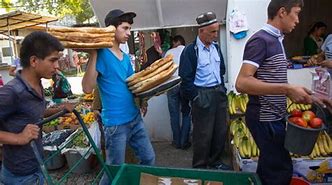Dushanbe and Bishkek: Two faces of Central Asian migration to Russia
Tajikistan and Kyrgyzstan the two countries in the region from which the largest number of labor migrants come. But the approach is quite different: the former seems to be abandoning its compatriots, while the latter operates a more careful policy, considering expatriates crucial to its economy. Pressures against Tajiks after the Krokus City Hall bombing in Moscow.
Moscow (AsiaNews) - Tajikistan and Kyrgyzstan are the two Central Asian countries from which the largest number of labor migrants travel to Russia; at the same time, they are also two very different ethnic and political realities, with different approaches and historical conflicts that are also reflected in the condition of compatriots seeking their fortunes.
Restrictions on migrant entry and activity in Russia continue for all, but the reactions of state bodies differ considerably.Tajiks stranded by the dozens at Moscow airports complain about the total absence of representatives of their embassy in Russia, who do nothing to help them solve the problems.
Authorities in Tajikistan say the pressures on migrants are not attributable to Russian policy but are effects of media campaigns, while those in Kyrgyzstan are making formal protests to protect their compatriots.
Bishkek's deputy foreign minister, Almaz Imangaziev, complained about this to the Russian ambassador to Kyrgyzstan, Sergei Vakunov, while expressing “understanding for Russia's concerns about guarantees to the country's security.”
The impression is that Kyrgyzstan has a migration policy that is more attentive to the needs of its own migrants, who are considered crucial to the country's economy, by invoking Eurasian Economic Union (EAES) rules to guarantee their rights.
The Kyrgyz diaspora within Russia appears to be much more organized than the Tajik diaspora, both in mutual support among compatriots and in its relations with Russian institutions and its own consular representations, proving to be more pliable and effective in its various initiatives.
Tajikistan's system is more centralized, both at home and abroad, and any decision requires the approval of authorities at the highest level. Tajiks in Russia have their hands tied, consulates do not intervene to settle various conflicts, and from Dushanbe it does not seem that labor migrants are considered so important to the economy; in fact, statistics about them are often distorted and put on the back burner.
Kyrgyz citizens who have received Russian citizenship, according to official figures, currently number about 600,000, and there were over a million before the Russian invasion of Ukraine, while labor migrants number about 400,000. When added up, the number of Kyrgyz on Russian territory reaches one million.
According to Eaes regulations, all of them enjoy full labor rights. Hence the protest of Kyrgyz Deputy Prime Minister Edil Bajsalov, who expressed disappointment against the latest Russian restrictions that prevent migrants from accessing the sectors of health, education and goods courier services when the salary exceeds 100 thousand rubles (about 1,000 euros).
The amount of Tajik citizens and migrants in Russia, however, remains debated in relations between Dushanbe and Moscow; Russians speak of more than two million, while Tajiks say it does not go beyond a few hundred thousand.
According to Tajikistan's Ministry of Labor, in the first six months of 2024 the flow of migrants to Russia dropped by 16 percent, remaining under 400,000 people, mainly due to pressure against Tajiks after the attack on Moscow's Krokus City Hall in March, attributed to Tajik Isis-K terrorists from the Velayat Khorasan.
Tajiks have also protested to the Russians, such as during the meeting between Emomali Rakhmon and Vladimir Putin, when the Tajik president stated that “terrorism has no nationality,” without leading to an improvement in the conditions of Tajik migrants in Russia.
Tajikistan nevertheless receives from its migrants a flow of money close to billion annually, about twice the value brought in by the Kyrgyz, who seek to more carefully defend this crucial sector of their social and economic life.
11/08/2017 20:05
21/05/2024 18:07
27/09/2023 18:00
22/09/2023 15:15








.png)










